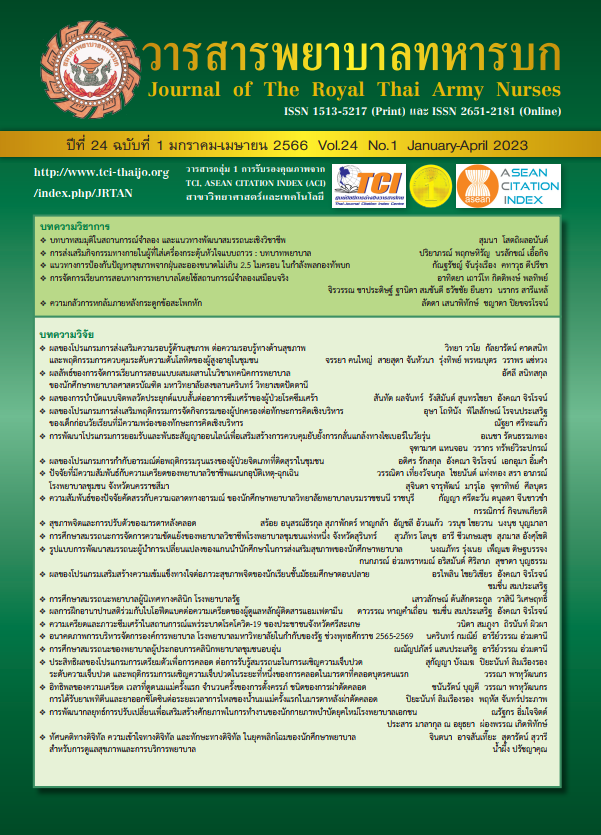A Study of Situations Expectations and Needs of Cancer Services
Keywords:
Service situations, expectations, needs of cancer servicesAbstract
The overall aims of this research are to study the situations of cancer services, and the expectations and needs of cancer care providers, patients, and their family members. The mixed-methods were mainly used in this research. The research samples consisted of 462 service recipients; and 86 service providers from 8 hospitals providing cancer treatment services. There were four sets of researching tools used: 1) an in-depth interview form; 2) a group discussion questionnaire, and 3) and 4) were questionnaires on the needs and expectations of patients and their family members toward cancer services. The data were collected from October 2020 to March 2021. Quantitative data were analyzed and reported as frequencies, means, percentages, and standard deviation. Qualitative data were analyzed by using content analysis.
The results: apart from diagnosis and treatment perspectives which were at a high level, the overall cancer services situations based on the perceptions of service users were at a moderate level. From an overall perspective of expectations and needs of cancer services, they were at a high level except for palliative care which was at a moderate level. In terms of health care providers, we found that they could work in line with the Service Plan, however, they had the expectations and needs of formulating clear strategies and operational guidelines in cancer services, creating an effective work and administration system, as well as developing working skills. There are some recommendations to improve cancer care services such as developing and providing cancer care services to address the individual needs of patients and their family members.
Downloads
References
BYAMUGISHA, Josaphat, et al. A health care professionals training needs assessment for oncology in Uganda. Human Resources for Health, 2020; 18.1: 1-11.
National Cancer Institute, Departmentof Medicine, Ministry of Public Health. Definition of indicators, service plan, cancer branch, 2018-2022. Bangkok: NationalCancer Institute, Department of Medicine, Ministry of Public Health; 2018.(in Thai)
Committee on Development of Service System to Respond to Major Health Issues (Cancer). Guideline for health service systemaccording to service plan (cancer). Bangkok: The Agricultural Cooperative Federation of Thailand Limited Press; 2013. (in Thai)
Tettanom P. Patient safety and Overcrowding in Emergency Room. Public Health & Health Laws Journal. 2018; 4(2): 238-49. (in Thai)
Thohinung U., et al. Cost of palliative care for pediatric cancer patients In Chiang Rai Prachanukroh Hospital. Thai Journal of Nursing Council. 2014; 29(3): 116-28.
Chulabhorn Royal Academy. Self assessment report Academic Year 2018. Bangkok: Chulabhorn Royal Academy; 2018. (in Thai)
The working group prepares regular reports. Non-communicable disease bureau year 2018. Annual Report 2018. 1th. Strategy, Planning and Evaluation Group Bureau of NonCommunicable Diseases, Department of Disease Control, Ministry of Public Health: Graphic and design publishing house; 2018. (in Thai)
Saikaew S., Tanatwanit Y. and Kunsongeit W. Effective Communication between Nurses and Advanced Cancer Patients: Journal of The Royal Thai Army Nurses, 2020; 21(2): 93-101. (in Thai)
Thiamthaanom R. Access to health services for cancar patients Nakornping Hospital. Nakornping Hospital Journal 2020;11(2): 132-44. (in Thai)
Sedgewick, J. R., Ali, A., Badea, A., Carr, T., & Groot, G. Service providers’ perceptions of support needs for Indigenous cancer patients in Saskatchewan: a needs assessment. BMC Health Services Research. 2021; 21(1):1-12.
Itsara A., et al. Effects of anemia on clinical outcomes among patients with chronic heart failure. Journal of Hematology and Transfusion Medicine. 2019; 29(1): 47-54. (in Thai)
Daoprasert K., et al. Prospective study and awareness of cancer patients on the quality of services in the radiotherapy outpatient department Lampang Cancer Hospital. Journal of Thai Society of Therapeutic Radiology and Oncology. 2015; 21(1): 79-86. (in Thai)
Lithong P. Palliative Nursing Care for Patients with Advanced Stage Lung Cancer at Home. Journal of Prachomklao College of Nursing, Phetchaburi Province. 2019; 2(2): 83-99. (in Thai)
Varasap P., Jitthavech J. and Lorchirachoonkul V. Risk factors for cancer. Journal of Science Ladkrabang. 2018; 27(2): 1-14.
Thapatlada K., et al. Development and Validation of A Scale Measuring Health Literacy for Breast and Cervical Cancer Prevention with Women’s Reproductive in Bangkok Metropolitan. Vajira Medical Journal: Journal of Urban Medicine, 2019; 63.Supplement: S31-42. (in Thai)
Roongporn P. and Jansook N. The Development of Health Literacy Promoting Model of Colorectal Cancer Patients Receiving Chemotherapy: Journal of MCU Nakhondhat. 2020; 7(9): 316-27. (in Thai)
Puengsook W.; Kanthawee H. and Markmee P. Factors Associated with Quality of Life among Cancer Patients with Palliative Care at the End of Life residing in Chiang Rai Province. Nursing Journal of The Ministry of Public Health, 2019; 29(2): 116-28. (in thai)
Nuekwen P., Hanprasitkam K. and Junda T. Nurses’ perceptions and practice on palliative care. Thai Journal of Cardio-Thoracic Nursing, 2016; 27(1): 128-41. (in Thai)
MCGUIRE, Shelley. World cancer report 2014. Geneva, Switzerland: World Health Organization, international agency for research on cancer, WHO Press, 2015. Advances in nutrition, 2016; 7(2): 418-9.
WORLD HEALTH ORGANIZATION. World health statistics 2010. World Health Organization, 2010.
Tonsuvan K., Suwonnaroop N and Watthayu N. Perceived Barriers to Implementing Evidence, Attitudes, and Research Experienc-es Toward Evidence–Based Nursing Practice among Professional Nurses in Health Promoting Hospital. The Journal of Baromarajonani College of Nusing, Nakhonratchasima. 2019; 25(2): 25-40. (in Thai)
Jatupornpipat T, Siritarungsria B and Banyati P. Model of Palliative Care Management for Patients with Advanced Cancers at Wangchao Hospital in Tak Province. The Golden Teak: Humanity and Social Science Journal, 2017; 23(1): 154-76. (in Thai)
Downloads
Published
How to Cite
Issue
Section
License
Copyright (c) 2023 Journal of The Royal Thai Army Nurses

This work is licensed under a Creative Commons Attribution-NonCommercial-NoDerivatives 4.0 International License.
บทความหรือข้อคิดเห็นใดใดที่ปรากฏในวารสารพยาบาลทหารบกเป็นวรรณกรรมของผู้เขียน ซึ่งบรรณาธิการหรือสมาคมพยาบาลทหารบก ไม่จำเป็นต้องเห็นด้วย
บทความที่ได้รับการตีพิมพ์เป็นลิขสิทธิ์ของวารสารพยาบาลทหารบก
The ideas and opinions expressed in the Journal of The Royal Thai Army Nurses are those of the authors and not necessarily those
of the editor or Royal Thai Army Nurses Association.






